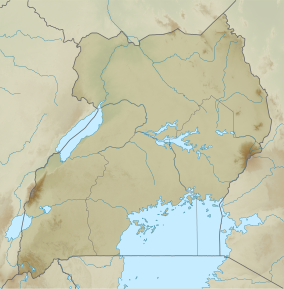Mgahinga Gorilla National Park
This article may require cleanup to meet Wikipedia's quality standards. The specific problem is: need to improve referencing and links. (June 2018) |
| Mgahinga Gorilla National Park | |
|---|---|
 Mgahinga Gorilla National Park, Uganda | |
| Location | Kisoro District |
| Nearest city | Kisoro |
| Coordinates | 01°22′10″S 29°38′25″E / 1.36944°S 29.64028°E |
| Area | 33.9 km2 (13.1 sq mi) |
| Established | 1991 |
| Governing body | Ugandan Wildlife Authority |
Mgahinga Gorilla National Park is a national park in southwestern Uganda. It was created in 1991 and covers an area of 33.9 km2 (13.1 sq mi).[1]
Geography
[edit]Mgahinga Gorilla National Park is located in the Virunga Mountains and encompasses three inactive volcanoes, namely Mount Muhabura, Mount Gahinga, and Mount Sabyinyo. In altitude the national park ranges from 2,227 to 4,127 m (7,306 to 13,540 ft) and is part of the Nile River watershed area. It is contiguous with Rwanda's Volcanoes National Park and the southern sector of Virunga National Park in the Democratic Republic of the Congo.[1]
The park is about 15 kilometres (9.3 mi) by road south of the town of Kisoro and approximately 55 kilometres (34 mi) by road west of Kabale, the largest city in the sub-region.[2]
Climate
[edit]The area experiences two wet rainy seasons: February to May; and September to December. The average monthly rainfall varies from 250 mm (9.8 in) in October to 10 mm (0.39 in) in July.
Biodiversity
[edit]The national park encompasses bamboo forest, Albertine Rift montane forests, Ruwenzori-Virunga montane moorlands with tree heath, and an alpine zone at higher altitudes.[1]
Wildlife
[edit]Primates present in the national park include mountain gorilla (Gorilla beringei beringei) with around 30 individuals split between one habituated and two unhabituated groups, and golden monkey (Cercopithecus kandti), an Albertine Rift Endemic whose range is now restricted to the Virungas and one other forest in Rwanda.[1][3] The checklist of 76 mammal species includes black-and-white colobus, leopard, African bush elephant, giant forest hog, bushpig, buffalo, Cape bushbuck, black-fronted duiker, and several varieties of rodents, bats and small predators.[4]
Of the Albertine Rift's endemic birds, the following were recorded in the national park during surveys in 2004: handsome spurfowl, dusky crimson-wing, red-throated alethe, Kivu ground thrush, Rwenzori turaco, Rwenzori batis, Rwenzori double-collared sunbird, collared apalis, mountain masked apalis, Archer's ground robin, stripe-breasted tit, blue-headed sunbird, regal sunbird, strange weaver, montane nightjar, red-faced woodland warbler and Grauer's swamp warbler.[5]
Tourism
[edit]Mgahinga Gorilla National Park is Uganda's smallest national park,[6] receiving one of the fewest annual visitor numbers of any national park in Uganda.[7] Popular tourist activities include mountain gorilla tracking, golden monkey tracking, volcano hiking, nature walks including to the gorge platform, bird watching and meeting the Batwa community.[6] Tourists visiting Mgahinga Gorilla National Park make a 9 hours drive from Kampala to reach the park.[8] The park is also connected by daily domestic flights from Entebbe International Airport and on to Kihihi Airstrip, which land at Kisoro Airport.[9]
History
[edit]Mgahinga Gorilla National Park was established in 1991 in an area that used to be a game reserve between the 1930s and 1950, but was partly converted to crop fields in lower altitudes. Biological surveys were initiated in 1989, wire traps destroyed, rangers trained and trees planted. Settlers were relocated to areas outside the national park's borders in the early 1990s.[1]
In November 2013, the M23 Movement, a Congolese rebel group, surrendered in the park after being defeated by the Congolese Army in the M23 rebellion.[10]
See also
[edit]References
[edit]- ^ a b c d e Butynski, T. M.; Kalina, J. (1993). "Three new mountain parks for Uganda". Oryx. 27 (4): 214–224. doi:10.1017/s003060530002812x.
- ^ Location of Mgahinga at Google Maps
- ^ Twinomugisha, D.; Basuta, G.I. & Chapman, C.A. (2003). "Status and ecology of the golden monkey (Cercopithecus mitis kandti) in Mgahinga Gorilla National Park, Uganda". African Journal of Ecology. 41 (1): 47–55. doi:10.1046/j.1365-2028.2003.00409.x.
- ^ Briggs, P. (2020). Uganda: The Bradt Travel Guide. England: Bradt Travel Guides Ltd. p. 527. ISBN 978-1-78477-642-8.
- ^ Owiunji, I.; Nkuutu, D.; Kujirakwinja, D.; Liengola, I.; Plumptre, A.; Nsanzurwimo, A.; Fawcett, K.; Gray, M. & McNeilage, A. (2005). Biological Survey of Virunga Volcanoes (PDF). New York: Wildlife Conservation Society.
- ^ a b "Mgahinga Gorilla National Park – Uganda Wildlife Authority". 6 May 2022. Retrieved 2022-06-01.
- ^ "Visitation to National Parks". Ministry of Tourism, Wildlife & Antiquities. Retrieved 2022-06-01.
- ^ "Kampala to Mgahinga Gorilla National Park". Kampala to Mgahinga Gorilla National Park. Retrieved 2022-06-01.
- ^ "Flight Schedule to Mgahinga Gorilla National Park". Savannah Wings. Retrieved 2022-06-01.
- ^ "DR Congo's M23 rebel chief Sultani Makenga 'surrenders'". BBC News. 2013.
External links
[edit]- "Overview of Mgahinga Gorilla National Park". Mgahinga Gorilla National Park.
- Official website



